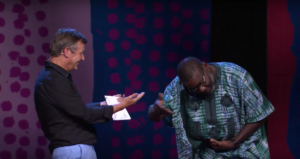This piece was the preface to a longer lead story that was possibly about justice. Again against the backdrop of the #EndSars…Justice today remains elusive. Enjoy!
The law is an ass. Many especially those who have suffered under the anvil of justice and vehemently protesting their innocence, implicitly believe this statement. And even those who have been fortunate in successfully evading the long flailing arms of the law have within our context found a relevant adjunct. Some courts are populated by marsupials – specifically, kangaroos.
Add to this veritable menagerie, this is comprehensible gobbledygook, being correspondence from a judge of the court in session in Scotland to an editor: “In the Nuts (unground), (other than groundnuts) Order, the expression nuts shall have reference to such nuts, other than groundnuts, as would but for this amending order not qualify as nuts (unground) (other than groundnuts) because of their being nuts (unground)” – the Guinness Book Of Records.
The total of this somewhat asinine computation is akin to the inscrutable judicial logic that befuddles us the “unlearned” lumpenproletariat when we observe the due process of the law in its perpetual quest for justice.
What usually on judicial authority is meted out, as justice seems to the untrained eye, given the sometimes-overwhelming sway of proof, as plain injustice? A good example was the so-called “trial” of Nigeria’s ex-President Shehu Shagari. A pedestrian, but crucial question, to ask is: Is it possible for the constitutional head of (what regrettably was) a kleptocracy to be utter without “blemish?” And one supposes that a learned reply that “justice is the correct application of a law as opposed to arbitrariness” would suffice as an answer.
An answer, yes, perhaps to those able to make the clinical distinction between the process of the law proper and other peripheral considerations, like morality, ethics and natural justice. But to many, the law must be seen to patently fair and just; this is not always so.
The story of King Solomon, recorded in 1 king: Chapter 3 verses 16 to 18 in the Holy Bible, deals with an adjudication which, arbitrary as it might seem, was an equitable judgment. It concerned two prostitutes who were haggling over the maternity of two babies, one dead and the other alive.
After King Solomon had threatened to cut the live baby into two halves, the real mother begged that the child should live, even at the risk of losing the baby to the other woman. The astute king immediately decided, on the strength of the woman’s compassion, that she was the mother of the disputed child.
But the dispensation of justice has long since changed and things have become more complicated. In 1911, the pure theory of law was in the staunchest traditions of legal positivism promulgated by Kelsen. He had, in a most antiseptic manner, sought to explain the law in the following terms: free from all extraneous and non-legal factors.
He saw the law as a coercive order of human behaviour built from “legal norms” which are valid only if authorised by legal norms of a higher rank. In effect, it became a chain of commands, with the ultimate order vested in the force of a basic norm – the Grundnorm. This basic norm, in his opinion, is “a juristic presumption or postulate implicit in legal thinking.”
And it is by the extension of this legal rationale that the coercive force of the law be applied strictly (and without considerations of the law be applied strictly (and without considerations to important cultural or socio-political factors) that makes the law an obdurate ass with blinders.
The mindless enforcement of the draconian decrees churned out by the Buhari administration’s fascistic machinery stands as a sterling example. The courts were emasculated, independent judgment was impossible and the nation could only watch aghast as justice was capriciously enforced.
The trend brought home and oblique sense, Chairman Mao Tse-tung’s truism that “power flows from the barrel of the gun.” Evidently, so does justice, especially under a military government. But even in the best of times, and then their application is usually selective.
According to the noble tenets of the Rule of Law as enunciated by Dicey (Law of Constitution 1885) – the regular law of the land predominates over and excludes the arbitrary exercise of power by the government. All people are equally subject to the law administered by the ordinary courts and that law is derived from individual’ rights as declared by the courts.
Under idyllic conditions, this would have been a blueprint for a legal system almost at par with the Karma law of retribution. But the reality is quite on the contrary: a cast-iron conspiracy has elevated the ruling elite way above the regular law of the land.
Those who shouldn’t be in jail are there and the majority of those who should be there are out on the streets, and the most infuriating part of this travesty is that the law has set them free. In the face of this, the cynic might readily agree with Britain’s King Henry VIII who suggested a long time ago that we should “first kill all the lawyers.”
But plainly annihilating our “learned friends” will only be a reversal to the Hobbesian state of nature, and although life, as it is today, is indeed “nasty, short and brutish,” every society does need a system of law for its very survival.
Quirkily as the law might seem, certain redoubtable men of law are always at work finding new arguments for redressing the intrinsic injustices of the legal system. The inimitable Lord Denning, the British Honourable Master of the Rolls, is widely admired for his common-sense approach to interpreting the law and its relevance to people and society.
Newswatch,
Monday, April 28 1986

Mr. Lardner holds a Bachelor degree in Philosophy from the University of Lagos, and over the last twenty-five years gathered wide international experience including serving as an Adjunct Professor, Centre for New Media at the Columbia University School of Journalism (1996-8) and as a Research Fellow, Freedom Forum Media Studies Centre (1992-3) also at Columbia University. Mr. Lardner was also a Reuter Scholar/Knight Fellow with the Department of Communications at Stanford University (1988-9).
Mr. Lardner is an Internet savvy and globally recognized media and communications expert, having managed complex communications advisory services for various countries including Nigeria, as well as a sought after public policy analyst with a deep and broad understanding of the uses and impact of new information technologies and communications paradigms in the process of good governance in transiting democracies. He is a TED Fellow and the Executive Director of WANGONeT a technology-based non-profit he founded in 2000. He is currently sits on the board of Orun Energy, a promising business start-up focusing on providing alternative power for the Telecommunications sector in the developing world.


